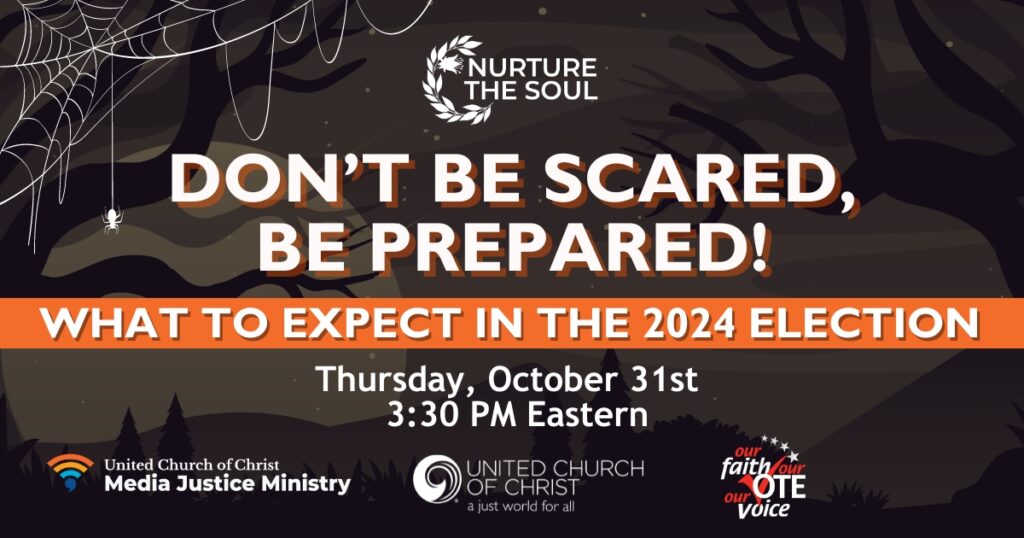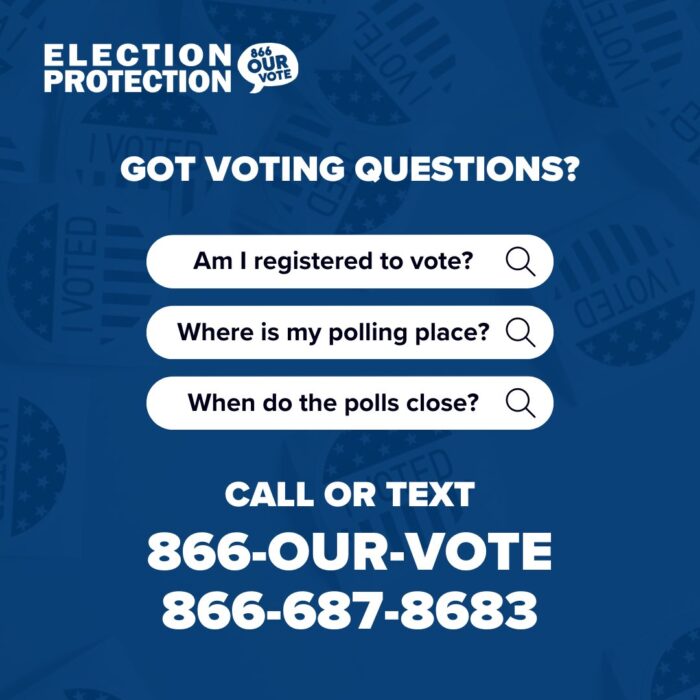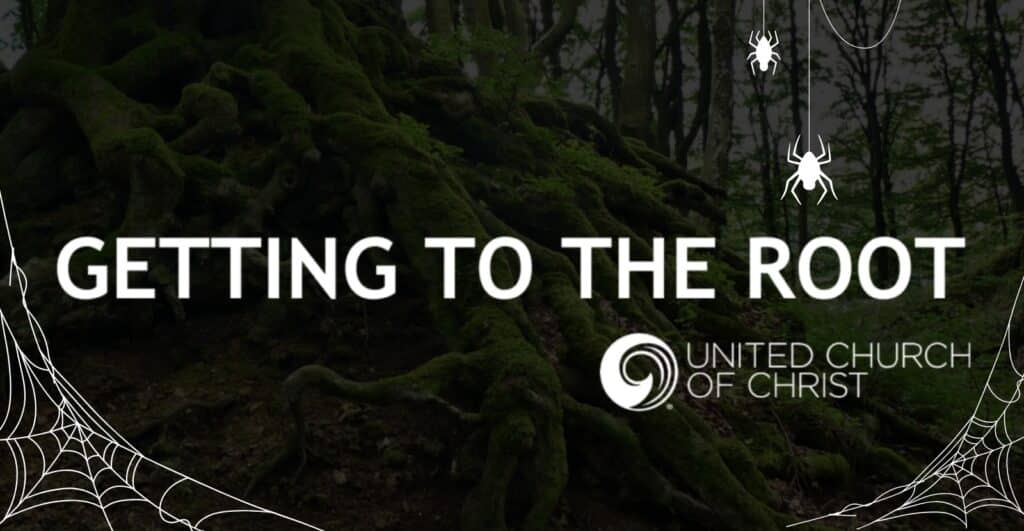Don’t be Scared, be Prepared: What to Expect in the 2024 November Election
With November 5th approaching fast, it can be difficult keeping the election anxiety at bay. The past few years have demonstrated how the time between the presidential election and the presidential inauguration can be uncertain, chaotic, and even scary. As some sow doubt about the strength of our electoral system for personal gain, foreign and corporate actors seek to influence the election for their own gain as well. As we read misinformation blaming immigrant communities for voting irregularities, we also see states purging voter registrations and installing prohibitive ID requirements.
But one of the best ways to keep the election scaries away is to have a plan in place, as a church, for the many scenarios that could play out on and after election day.
For those itching to know how they and their church can get involved with responding to whatever happens on election day and beyond, we have provided this resource to help churches discern their role as community leaders in keeping our elections safe and accessible, and protecting our sacred democracy.
Register for our upcoming webinar Thursday, October 31st:

Potential Threats to a Safe and Accessible Election Day
Misinformation & Disinformation
Misinformation is unintentionally false information. Disinformation is intentionally false information. Both can play a powerful role in negatively influencing public opinion and voter behavior, especially with the accelerated spread of messages through social media. Deceptive practices, accelerated through the use of AI technology, sow confusion among voters, spreading doubts about the mechanics of voting and the integrity of our electoral process. Examples include:
Misinformation & Disinformation
- Robocalls falsely communicating a change to polling location or hours
- Conspiracy theories and falsities about candidates, parties, the election
- Lies surrounding election integrity
Scapegoating
Scapegoating is when a certain group of people who share a certain characteristic such as race, gender, immigration status, or sexuality is falsely blamed for something that occurred. This blame is used to scare voters into voting for a certain party or candidate by using this group of people to either explain policy failures or distract from candidate weaknesses. The scapegoating of marginalized communities can trigger violence towards those communities and is normally used for personal or political gain by the perpetrator. Examples include:
Scapegoating
- Conspiracy theories of noncitizens voting in the election
- Accusations of specific demographics being solely responsible for a candidate winning or losing their race
Voter Suppression
Voter suppression is when an individual or group attempts to influence an election outcome by discouraging or preventing others from voting. There is a long history of voter suppression in the United States, often targeting communities of color. Examples include:
Voter Suppression
- Increasing voter ID requirements, which can be overly burdensome and block millions of eligible American citizens from voting
- Limited number of polling locations in a certain state or area, limited number of poll workers
- Restrictions on when and how to cast mail-in ballots
- Restrictions on early voting
- Voter intimidation and violence at the polls
- Recently we have seen certain lawmakers and governors “purge” what they believe are outdated registrations or ineligible registrants in an effort to fight voter fraud (which has an incidence rate of between 0.0003 percent and 0.0025 percent). Sometimes officials accidentally purge eligible voters. As a result, these voters may show up to vote and find that they can’t cast a regular ballot.
How to Respond to Election Protection Threats:
How to Respond

As churches and congregations, you have the unique ability to be a trusted provider of information to your congregation. Stay connected with those who are poll workers and poll chaplains (feel free to use your election/Our Faith Our Vote campaign committee to do this), as well as election officials and your local mayor to receive trusted elections information and provide them with any stories of election barriers your congregants face.
Teach congregants how to sort between trusted and untrusted news sources, and provide them with the Election Protection Hotline (866-OUR-VOTE/866-687-8683/888-VE-Y-VOTA/888-839-8682/888-API-VOTE/888-274-8683/844-YALLA-US/844-925-5287).
As the primary or significant source of community for our members, churches have within their very institutions the ability to build resiliency networks, meant to withstand the many threats we face in the upcoming election. We can live out our calling as people of faith to love one another by building a resiliency network in advance of this election. Use your networks and Our Faith Our Vote campaign/elections committee to build connections to local election officials, local mayors, other churches, and poll workers and poll chaplains in your congregation. Use these people to help when situations arise.
Having people of faith present at the polls, particularly when there may be voter intimidation, or issues on or after election day, is one way your church can have a unique role in election protection. These suggestions can help you or your congregation respond to any election or post-election issues using your resiliency network referenced above to help implement this presence.
- Encourage members to become Poll Chaplains (sign up for a training here) through the UCC partner organization Faiths United to Save Democracy.
- Encourage members to become Poll Workers (sign up for a training here) through UCC partner organization Power to the Polls
- Maintain a presence in response to voter intimidation or threats of violence.
- If there are reports coming from your resiliency network of violence or voter intimidation at the polls, certain faith leaders or communities who have already been trained on know your rights protocol and safety practices in peacekeeping may be able to use their presence as a tool for de-escalation.
- You can explore local or virtual online trainings in de-escalation practices for election-related scenarios, such as the Poll Chaplain training above. Reach out to your local ACLU affiliate for Know Your Rights training. If you do decide to play this peacekeeping role, here are a few ideas:
- Act as faith-based observers at the polls and work with any poll chaplains or poll workers in your resiliency network to help deescalate any tension or potential for violence
- Offer accompaniment to the polls, in which congregants would accompany voters in line to ensure they safely make it to vote
- Offer first aid supplies or food and water to any in need
- Open your church as a sanctuary for anyone in need
There may be a time when a certain election scenario requires the moral guidance of a faith community. Faith groups can help guide their community towards justice. Below is a menu of actions your church can participate in when called to the public square. Make sure to check your local permitting and election laws in advance.
- Host/Join an interfaith prayer vigil for a peaceful and fair election.
- Host/Join a press conference sharing your church’s (nonpartisan) views surrounding the election and issues at stake.
- Work with a local legal nonprofit to sign or author an amicus brief in case of an election dispute filed in court
- Ensure you are following 501(c)(3) guidelines, and therefore advocating for a fair, peaceful election (rather than a certain party or candidate)
- Host/Join a rally in support of counting every vote.
- Host/Join a Pray-In in front of a government building or polling location.
Your faith community can help support its members through whatever happens during and after election day. Download Join the Movement’s spiritual care package to help your congregation care for one another during this time.
Now let’s look at a few election scenarios, where you can see how certain election issues can lead to an impactful response by your faith community. These scenarios are intentionally troubling, if not scary, so we welcome you to take a moment to check in with yourself before reading further. This topic is a heavy one, and we want to ensure this resource is helpful, not harmful.
Scenario #1: Pandemonium in Philadelphia
Scenario 1: The Situation
On election day, thousands of voters in Philadelphia report receiving robocalls saying that their precinct has been changed. These calls were AI-generated and were designed to get voters to appear at the wrong location. It is unclear how many voters were prevented from casting a ballot due to this operation, but most of the individuals targeted appear to be voters of color. Poll chaplains spoke to a handful of voters at polling sites who had received the robocall.
In states that Vice President Harris won, lawsuits have been filed claiming that noncitizens voted during the election. Some of these lawsuits have been rejected due to their lack of evidence, but the claim is being used by some Republican members of the U.S. Senate as pretext to support objections to the electoral slates sent by Michigan and Wisconsin – two states that voted for Ms. Harris.
The Trump campaign also won a lawsuit at the U.S. Supreme Court that stopped the counting of mail-in ballots in Pennsylvania that arrived after election day. The ballots that were not counted were greater in number than the gap between former President Trump and Vice President Harris in Pennsylvania. Donald Trump is declared the winner of the presidential election by 19 electoral votes (a number equaling the number of electoral votes from PA) while losing the popular vote by almost 6 million votes.
Many elected Democrats, media figures and others are challenging the legitimacy of the election due to the allegations of voter suppression and the mail-in ballots that were not counted due to the lawsuit. Pro-democracy movement organizations, including interfaith coalitions, are divided on whether to challenge the election results in Pennsylvania.
Churches can act as key de-escalators, providers of trustworthy information, and support networks during a time of electoral chaos in our nation. Churches and clergy can also be a source of moral leadership, and some may have the ability to act using this leadership to help protect the vote.
Below is a menu of faithful responses churches can take to various election scenarios:
Scenario 1: Our Responses
- The incidence of noncitizens voting is less than 0.0001 in this country, and even less of these votes make it through the highly rigorous counting and canvassing of ballots
- Stand in solidarity with our immigrant neighbors, who are put at risk by these unfounded claims, and as you debunk this misinformation, reach out to the immigrants in your congregation and immigrant communities around you to provide care for those communities
- You can also author or support an amicus brief in the case regarding the noncitizen voting issue arguing that treating noncitizens as scapegoats in the electoral process is based in racist and xenophobic ideologies that stand in violation to your faith
- Support democracy by holding a prayer vigil, press conference, or rally in support of counting every ballot
- Use social media to amplify this message
- Ensure a rapid response team from your church (you can use your Our Faith Our Vote campaign committee for this if you have one) is in communication with the poll chaplains and poll workers in your church, as well as the mayor and election officials
- Use them as trusted sources of information, which you can cite in your communications
- Ensure that team also tells the congregation that if they learn last minute changes to polling locations or hours, to call the election protection hotline (866-OUR-VOTE/866-687-8683/888-VE-Y-VOTA/888-839-8682/888-API-VOTE/888-274-8683) and let the team know, so that they can also help inform local officials of any potential misinformation campaign
- Offer pastoral and spiritual care to your congregants to ensure they take care of themselves as the election drama unfolds
- Send communications offering to talk to anyone feeling anxiety or worry regarding the election
- Share the UCC’s spiritual care package for the election
- Send communications offering to talk to anyone feeling anxiety or worry regarding the election
- Share the UCC’s spiritual care package for the election
Now let us consider another scenario of what we could face in November. Before reading the menu of responses, take some time to think through potential responses yourself. What could you and your church do to help protect the election? What might you not be ready for? What do you need to do to make sure you are prepared to respond?
Scenario #2: Madness in Michigan
Scenario 2: The Situation
During early voting, protests at polling locations throughout Michigan amounted to intimidation of voters and led to lower-than-usual voter turnout rates throughout the state. In parts of Wayne County, bomb threats were called in on election day at five polling locations in majority-Black neighborhoods. The response required these polling locations to close for multiple hours while the threats were investigated. This impacted precincts with over 10,000 voters in total.
As a result of the confusion and chaos, Democrats request a court order to expand voting hours until midnight in Wayne County (a heavily Democratic district). Republican Party officials are preparing to challenge the court order – and claim that the extension of hours in Wayne County is “election interference.”
Republican voters are reporting receiving calls from former President Trump telling them that the election has been moved to the next day and telling them not to vote on Election Day. The callers likely used AI to spoof his voice, and early reports indicate that the calls could be part of a foreign interference campaign. It is unclear how many voters received this call, and how many decided not to vote as a result of the call.
Poll chaplains (maybe in your network) are serving throughout the state (and across the country) and are witnessing the chaos, but also seeing backup plans that are put into place to accommodate voters. As tensions rise, poll chaplains are reporting concerns about the potential for violence. Both parties are planning rallies in Detroit and Lansing on Election Night.
Scenario 1: Our Response
- Ensure a rapid response team from your church (you can use your Our Faith Our Vote campaign committee for this if you have one) is in communication with the poll chaplains and poll workers in your church, as well as the mayor and election officials
- Use them as trusted sources of information, which you can cite in your communications
- Ensure that team also tells the congregation that if they learn last minute changes to polling locations or hours, to call the election protection hotline and let them know, so that this team can also help inform local officials of any potential misinformation campaign
- Have your OFOV campaign committee send an email to all congregants, and blast it on your social media
- Use your community to help organize transportation to and from the polls and childcare for any in need
- Support democracy by holding a prayer vigil, press conference, or rally in support of counting every ballot and extending voting hours for those affected precincts
- Use social media to amplify this message
- Help deescalate by assembling clergy and congregants to congregate in places that are ripe for escalation of violence and counterprotest by calling for peace and nonviolence
- Provide food and aid to those areas where there is potential for escalation
- Only do this action if your clergy and congregation have been trained in peacekeeping and nonviolent de-escalation
- Faith observers can stand and observe the electoral process, and act as de-escalators when needed
- Check your local election laws before moving forward with this option
- Consider giving them food, water, aid, and spiritual and emotional support
- Depending on your church’s location, you can base your response from your own church building.
- From your building you can welcome people waiting for their polling location to open, and give food and aid and shelter to anyone in need
As Election Day approaches, it is critical for faith communities to take a moment and consider scenarios such as these. Having a plan in place is ultimately the best method to address the election anxiety within our congregations and within ourselves.
But while considering these frightening scenarios is important, we must not let fear dominate the conversation. As people of faith, we can play a unique role in this election cycle by empowering every voice in our congregations and offering a hope-filled vision of the future for all people. Upholding our democracy is a sacred, ongoing commitment we make to each other. Regardless of the outcome of this election, our work as a community of faith and love will continue on.
Questions? Contact the UCC Office of Public Policy and Advocacy in Washington D.C.
UCCTakeAction@ucc.org
Related News
State of the (Dis)Union: Our Constitutional Crisis
In the 45 days since Inauguration Day, we have witnessed overwhelming changes in our federal...
Read MoreCrisis Control: An International Conflict Roundup
In a world embroiled in conflict, it is hard to know where to focus one’s time, energy, and...
Read MoreLeading with Love in 2025
This new year brings us a new Congress, new administration, and new political landscape across...
Read More

